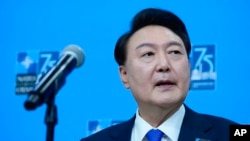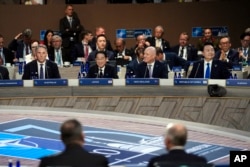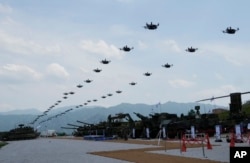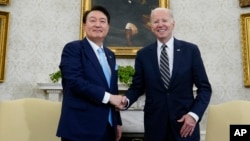At the NATO summit this week, South Korea found narrow options to deal with security threats it faces from Russia-North Korea military cooperation, but concrete actions to boost Pacific security are likely to follow, analysts said.
South Korean President Yoon Suk Yeol met with NATO allies and partners at the summit in Washington where discussions involved their support for Ukraine and Euro-Atlantic cooperation with the Indo-Pacific.
At a meeting between NATO allies and the IP4 partnering Indo-Pacific countries of Australia, Japan, New Zealand and South Korea on Thursday, Yoon underlined threats that deepening Moscow-Pyongyang ties pose to Seoul.
"Military and economic support that Russia can provide North Korea will increase threats posed to the security of the Korean Peninsula and the Indo-Pacific," Yoon said, calling for cooperation between the two countries to be "thoroughly blocked."
Following their meeting, IP4 countries issued a joint statement condemning "the illicit military cooperation" between Russia and North Korea.
Washington and Seoul have estimated that North Korea has sent about 10,000 containers of munitions to Russia. Moscow and Pyongyang denied any arms transactions.
White House national security adviser Jake Sullivan said at a forum Tuesday that the U.S. is "watching carefully to see what Russia provides" to Pyongyang in return and "what impact that has on the security of the Indo-Pacific."
A spokesperson for the U.S. State Department told VOA's Korean Service on Friday that "efforts by Russia to bolster [North Korea] militarily will only lead to a strengthening of our security partnership with allies across the Indo-Pacific and Europe."
Analysts said NATO's response to Russia-North Korea military cooperation in East Asia is limited for now to include joint drills and naval patrols, but closer cooperation among IP4 countries is expected.
Evans Revere, who served as the acting assistant secretary for East Asia and Pacific affairs during the George W. Bush administration, said, "The emerging partnership between NATO and IP4 is a work in progress, and the coming months will see new cooperative efforts between and among the partners."
He said that could include a U.S. effort to institutionalize IP4 by adding "substance and action-oriented specifics to this group."
Deputy Secretary of State Kurt Campbell said in an interview with South Korean news agency Yonhap on Wednesday that the U.S. wants to "institutionalize" IP4, which would involve Seoul playing a "global role going forward."
Joint drills
NATO Secretary-General Jens Stoltenberg said at a public forum Wednesday that NATO allies are actively looking into how they can have naval exercises with Asia-Pacific partners in addition to air drills.
Japan is scheduled to hold a series of joint air drills with Germany, Spain and France — all NATO members — in July.
Patrick Cronin, the Asia-Pacific security chair at the Hudson Institute, said, "Selective NATO member states capable of exercising with South Korea and Japan and other Indo-Pacific partners underscores international support for Seoul's national interest in maintaining peace in its region."
Andrew Yeo, the SK-Korea Foundation chair at the Brookings Institution, said, "I wouldn't be surprised if there are more, more coordinated types of exercise so that if there were conflict that would erupt, there would be ways of different militaries to cooperate."
Maritime patrols
At a NATO public forum Thursday, Yoon underlined significant contribution to the region provided by joint maritime patrols that some NATO members conduct to enforce sanctions on North Korea.
Canada and the United Kingdom as well as IP4 members Australia, Japan and New Zealand have been participating in maritime patrols to enforce those sanctions.
However, there are limits to what these patrols can do, according to Bruce Klingner, senior research fellow on Northeast Asia at the Heritage Foundation.
Klingner said, "The lack of authority to intercept violating ships limits the missions to monitoring violations."
He continued, "Maritime shipments cannot be intercepted since U.N. resolutions against North Korea were implemented with Chapter 7, Article 41 authority, which does not allow for interceptions on the high seas. Any international response will be in term[s] of [a] punitive economic response or providing additional military assistance to Ukraine or Indo-Pacific nations threatened by North Korea."
US nuclear deterrence
Yoon and President Joe Biden met on the sidelines of the NATO summit Thursday and later issued a joint statement on guidelines for nuclear deterrence and operations on the Korean Peninsula.
The guidelines, signed by defense officials, provide ways to integrate Seoul's conventional weapons and Washington's nuclear weapons in various contingencies. The U.S. and South Korea will conduct joint exercises to implement the deterrence guidelines, Kim Tae-hyo, South Korea deputy national security director, told a news conference Thursday in Washington.
"At the end of the day, the security architecture in Asia depends fundamentally on the U.S. relationship with the ROK, Japan, Australia and New Zealand," said Gary Samore, former White House coordinator for arms control and weapons of mass destruction during the Obama administration.
ROK stands for the Republic of Korea, South Korea's official name.
"Even though the U.S. would like to see something like NATO in Asia, we haven't reached that point yet, though there are small steps in that direction, like joint exercises," he continued.
UN Command
At a meeting with Yoon on Wednesday, Germany expressed its willingness to join the U.N. Command (UNC), a multinational military body created at the beginning of the Korean War of 1950-53 to defend against North Korean aggression.
"NATO has no direct role" on the Korean Peninsula, said Robert Rapson, who served as charge d'affaires and deputy chief of mission at the U.S. Embassy in Seoul.
But he said several key NATO members "have a security-related presence" in the UNC and could "contribute towards maintaining security and stability" there.
Pyongyang on Monday said it would regard a U.S. attempt to revive the U.N. Command as "the second version" of NATO.







